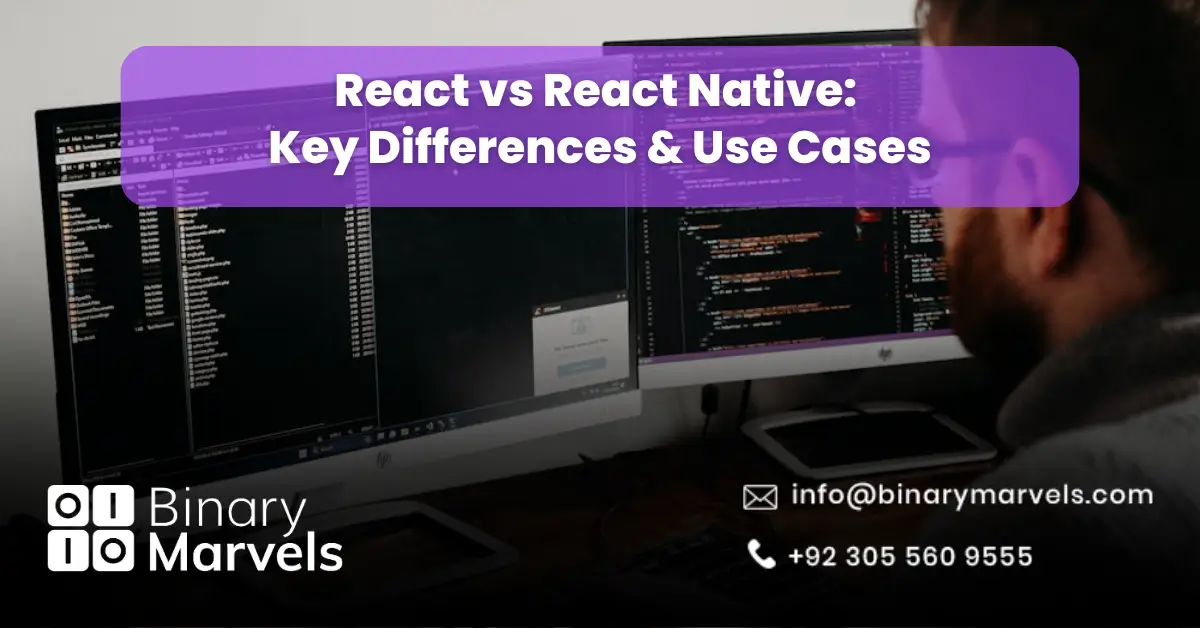
In the ever-evolving world of web and mobile development, React and React Native have become two of the most talked-about technologies. Despite sharing the word “React,” they serve vastly different purposes. So, when should you use React over React Native, or vice versa?
In this guide, we’ll break down the differences, pros, cons, and real-world use cases of React vs React Native, helping you make the right choice for your next digital product.
What Is React?
React, also known as React.js or ReactJS, is a JavaScript library developed by Facebook for building interactive user interfaces for web applications. It focuses on the view layer (the “V” in MVC) and allows developers to build reusable UI components.
Key Features of React:
- Component-based architecture
- Virtual DOM for high performance
- One-way data binding
- JSX syntax (JavaScript + HTML)
- Rich ecosystem and community support
Popular Websites Using React:
- Airbnb
- Netflix
- WhatsApp Web
Also Read: React Query (useQuery)
What Is React Native?
React Native is a framework (not just a library) created by Facebook for building cross-platform mobile applications using JavaScript and React principles. It lets you write mobile apps that run on both iOS and Android—with a single codebase.
Key Features of React Native:
- Native-like UI and performance
- Platform-specific components
- Hot Reloading for faster development
- Integration with native modules (written in Swift, Java, Kotlin, etc.)
- One codebase for multiple platforms
Apps Built with React Native:
- Discord
- Walmart
- Bloomberg
React vs React Native: Head-to-Head Comparison
| Feature/Aspect | React | React Native |
|---|---|---|
| Platform | Web | Mobile (iOS, Android) |
| Language Used | JavaScript + JSX + HTML/CSS | JavaScript + JSX (with native components) |
| Rendering | Virtual DOM | Native components via a mobile bridge |
| Performance | Great for web | Near-native performance on mobile |
| Styling | CSS, SCSS, CSS-in-JS | React Native’s StyleSheet (no CSS) |
| Code Reusability | Mostly for web | Shared logic + some shared UI across platforms |
| Navigation | React Router | React Navigation |
| Deployment | Web servers (Netlify, Vercel, etc.) | App Stores (Play Store, App Store) |
| Community Support | Mature, huge ecosystem | Strong, still growing |
When Should You Use React?
Choose React if you are:
- Building web applications or progressive web apps (PWAs)
- Targeting desktop and mobile browsers
- Working on dashboards, admin panels, blogs, or SaaS platforms
- Looking for rich UI interactivity in your web pages
- Already using a stack like MERN (MongoDB, Express, React, Node.js)
Use Case Examples:
- Building a web-based CRM dashboard
- Creating an e-commerce frontend for desktop and mobile web
- Designing a personal blog with rich user interaction
Also Read: Styled component in React.js
When Should You Use React Native?
Choose React Native if you are:
- Building mobile-first applications
- Targeting iOS and Android users
- Wanting to reduce cost and time by using one codebase for two platforms
- Aiming to provide a native-like user experience
- Already using React for your web app and want code reuse
Use Case Examples:
- Developing a mobile banking app
- Creating a social media app with real-time chat
- Launching a startup MVP for both Android and iOS
Can React and React Native Work Together?
Yes, many companies use React for their web app and React Native for their mobile apps. Both share the same core concepts like components, props, state, and hooks, making the developer transition smooth.
With tools like Expo, React Native Web, and monorepos, it’s even possible to reuse code between web and mobile—though with some limitations.
Pros and Cons of React
✅ Pros:
- Fast rendering with Virtual DOM
- Large community and ecosystem
- SEO-friendly with SSR (Next.js)
- Great for SPAs and PWAs
❌ Cons:
- Only handles UI (need external libraries for routing, state management)
- Steeper learning curve with JSX and tooling
- Frequent updates may be hard to keep up with
Pros and Cons of React Native
✅ Pros:
- One codebase for two platforms
- Faster development & cost-effective
- Native-like performance
- Large open-source support and libraries
❌ Cons:
- Debugging can be challenging (bridge issues)
- Native module dependency for complex features
- Slower performance than fully native apps in some cases
- Still catching up in enterprise adoption compared to native
React vs React Native: Which One Should You Learn First?
If your goal is to become a frontend developer, start with React. It’s foundational and used across the web. Once you’re comfortable with component-based development, JSX, and state management, transitioning to React Native is much easier.
If you’re aiming to build mobile apps quickly or want to get into cross-platform mobile development, React Native is a great starting point—especially with Expo simplifying the process.
Also Read: How to configure antd version 5 with Next.js and React.js
React vs React Native: Future Outlook in 2025
Both technologies continue to thrive in 2025.
- React remains the dominant UI library for web development, supported by frameworks like Next.js and Remix.
- React Native is growing rapidly, with enterprise-level support and improvements in performance, especially with Fabric, TurboModules, and Hermes engine.
Together, they represent a unified development ecosystem for building cross-platform applications with shared design systems and code.
Final Verdict: React vs React Native — Which Should You Choose?
Choose React if:
- You’re building a web-based product
- Your target users are desktop and mobile browser users
- You need SEO support and fast rendering
Choose React Native if:
- You’re building a mobile app
- You want to save time and cost with one codebase
- You aim for near-native performance across platforms
Ultimately, the choice between React vs React Native depends on your project type, audience, and long-term product goals.
FAQs: React vs React Native
Q1: Is React Native better than React?
Not necessarily. React is best for web, while React Native is best for mobile. Both serve different needs.
Q2: Can I use React Native for web development?
Technically yes, using tools like React Native for Web, but it’s not as straightforward as using React.
Q3: Is React Native cross-platform?
Yes, it supports Android, iOS, and even web and desktop (with some extra tooling).
Q4: Can I learn React Native without learning React?
You can, but it’s highly recommended to learn React first since React Native builds upon it.
Optimize Your Stack with the Right Choice
Now that you understand the core differences between React vs React Native, it’s time to align your tech stack with your business goals. Choose wisely—and future-proof your development roadmap with the right technology for the right platform.









